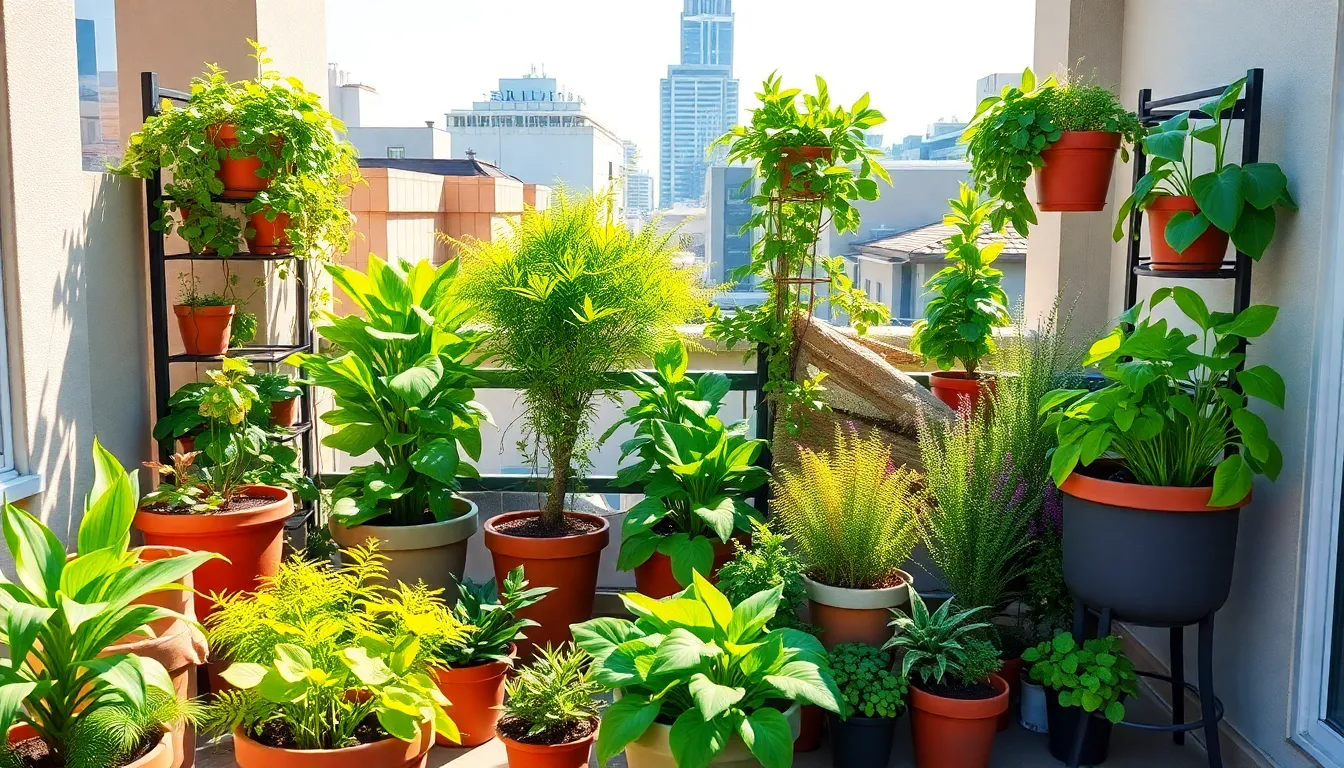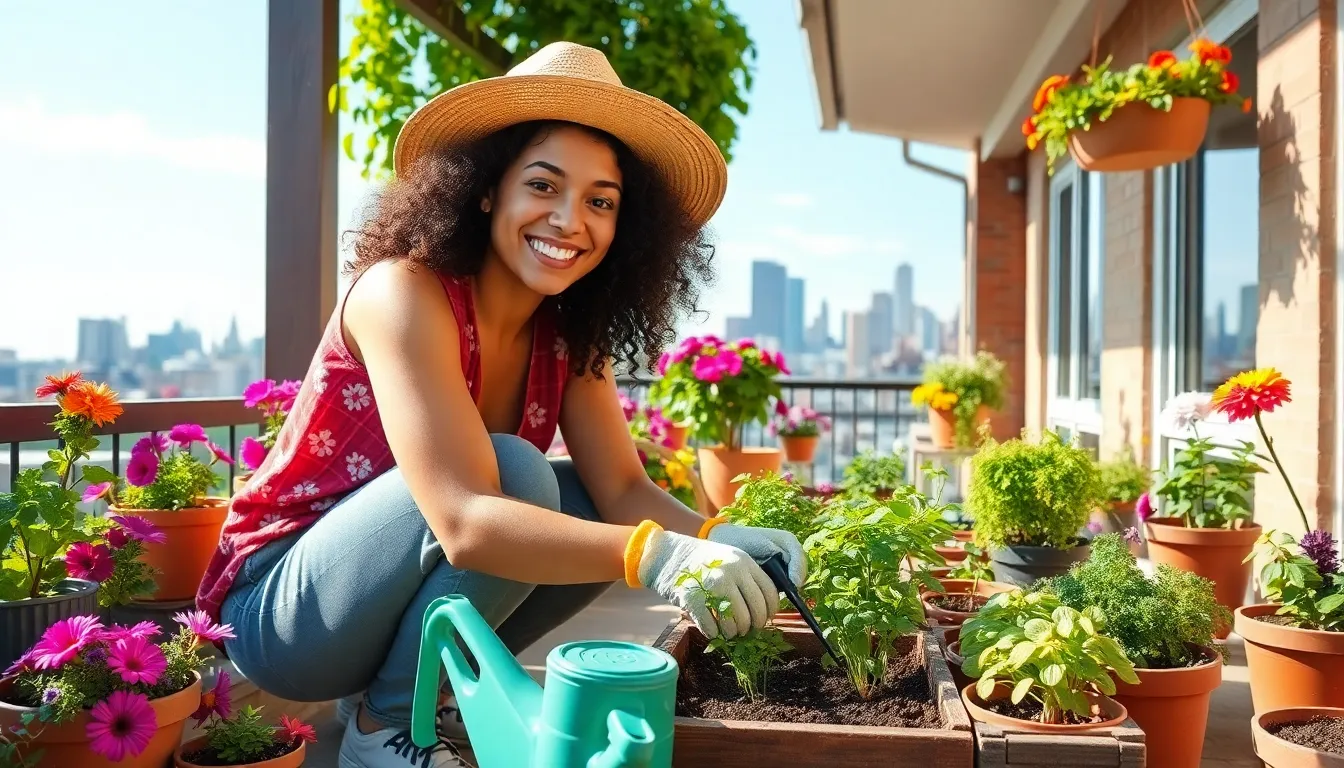In a world where concrete jungles reign supreme, urban gardening is the secret weapon for those craving a touch of green in their lives. Imagine transforming that drab balcony or tiny backyard into a vibrant oasis where herbs, veggies, and flowers flourish. The right urban gardening book can turn anyone into a green-thumbed guru faster than you can say “compost pile.”
Urban Gardening Book
Urban gardening books serve as essential guides for individuals interested in creating green spaces in urban settings. These resources equip readers with practical knowledge and inspiration to effectively cultivate gardens in limited spaces.
Importance of Urban Gardening
Urban gardening plays a significant role in enhancing city living. It helps improve air quality by introducing plants that absorb pollutants. Gardening also fosters mental well-being by providing therapeutic activities. Additionally, these gardens can yield fresh produce, promoting healthier eating habits. Community engagement thrives as urban gardens encourage social interactions among neighbors.
Key Features to Look For
When selecting an urban gardening book, consider practical tips tailored for small spaces. Look for books that include step-by-step instructions for various plants. Additionally, comprehensive sections on soil health and pest control provide valuable information. Many effective books feature visually appealing layouts with photographs and diagrams for clarity. Lastly, an emphasis on sustainable practices reflects current trends in urban gardening, ensuring alignment with eco-friendly values.
Top Urban Gardening Books

Urban gardening books provide essential knowledge for transforming small spaces into thriving green areas. Whether seeking practical tips or inspiration, the right book serves as a valuable resource.
Book Recommendations
“Square Foot Gardening” by Mel Bartholomew lays a foundation for compact planting. “The Urban Gardener” by John Walker focuses on sustainable practices, ideal for eco-conscious individuals. “Container Gardening for Beginners” by Jennifer Smith caters to those with limited space, offering straightforward advice for growing plants in containers. “Vertical Gardening” by Bob Flowerdew illustrates creative ways to maximize vertical spaces, perfect for balconies. These selections offer varied approaches to urban gardening, ensuring readers find methods that suit their lifestyle.
Authors to Consider
Mel Bartholomew emphasizes efficiency and simplicity in gardening. John Walker’s background in environmental science influences his sustainable gardening techniques. Jennifer Smith, an advocate for newcomers, provides accessible guidance for all. Bob Flowerdew’s expertise in vertical gardens showcases innovative solutions for urban constraints. Familiarizing with these authors enriches the urban gardening experience and offers diverse perspectives on transforming urban settings into lush, productive spaces.
Benefits of Reading Urban Gardening Books
Urban gardening books offer practical insights for transforming small spaces into thriving gardens. These resources simplify complex gardening concepts, making them accessible to beginners and experienced gardeners alike.
Gaining Knowledge and Skills
Urban gardening books provide essential information about soil composition, planting techniques, and pest management strategies. Readers discover diverse plant types suitable for confined areas, enhancing their ability to create productive gardens. Step-by-step instructions guide individuals through the setup process, ensuring confidence in their gardening endeavors. These resources often include troubleshooting tips for common issues, empowering readers to overcome obstacles effectively. Instructional content focuses on sustainable practices, promoting environmentally friendly gardening methods.
Inspiration for Your Gardening Journey
Urban gardening books ignite creativity and foster a sense of possibility. Readers encounter beautiful illustrations and photographs that showcase extraordinary gardens in limited spaces. This visual stimulation inspires individuals to experiment with various planting arrangements and techniques. Authors often share personal stories and experiences, sparking motivation and excitement for new gardening projects. Unique design ideas help transform ordinary spaces into extraordinary urban oases. Connecting with these narratives encourages readers to envision their gardening potential and take action in their environments.
How to Choose the Right Urban Gardening Book
Selecting an urban gardening book involves a few key considerations. Prioritizing the right aspects ensures a more effective and enjoyable gardening experience.
Assessing Your Gardening Goals
Defining specific gardening goals clarifies the purpose of the garden. She may aim for enhancing aesthetics, growing food, or creating a habitat for wildlife. Identifying these goals influences the choice of book significantly. Books tailored to specific interests, such as edible plants or ornamental gardens, provide targeted advice. Seeking out titles that align with these aspirations enhances the learning experience and supports successful outcomes.
Considering Your Space and Environment
Understanding the limitations and advantages of available space shapes gardening choices. Urban settings often limit gardening areas in terms of sunlight, soil type, and available square footage. Assessing these factors leads to a more informed book selection. Choosing books that focus on small spaces, such as balcony or rooftop gardening, offers practical tips. Resources covering light and moisture requirements for different plants further guide effective planning in urban gardens.
Conclusion
Urban gardening offers a unique opportunity to bring life and sustainability to city living. With the right resources such as urban gardening books individuals can cultivate their green spaces effectively. These books not only provide essential knowledge but also inspire creativity and community engagement.
By selecting the right book tailored to specific gardening goals and space limitations anyone can transform their outdoor areas into thriving gardens. Embracing urban gardening not only enhances personal well-being but also contributes positively to the surrounding environment. As more people discover the joys of urban gardening they’re likely to foster a deeper connection with nature and their communities.

